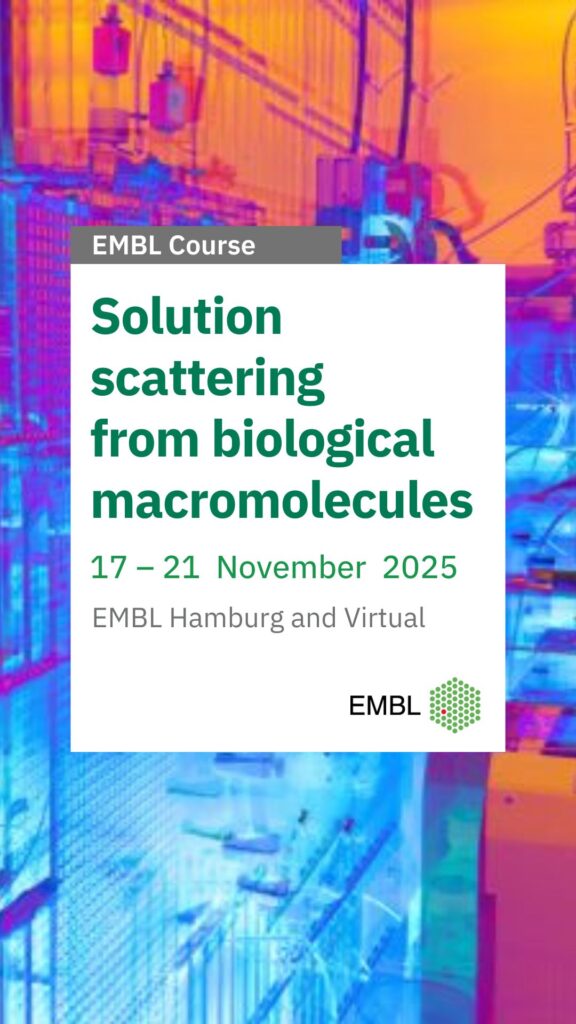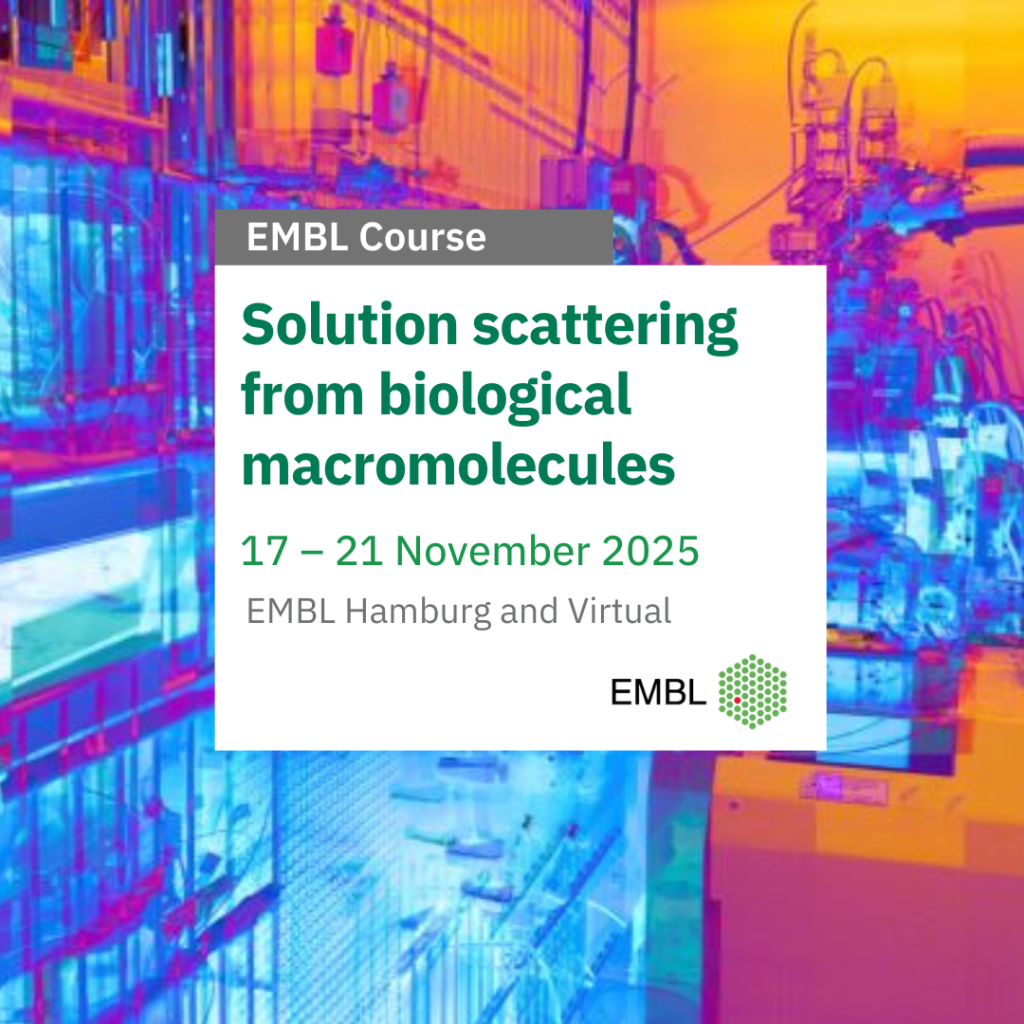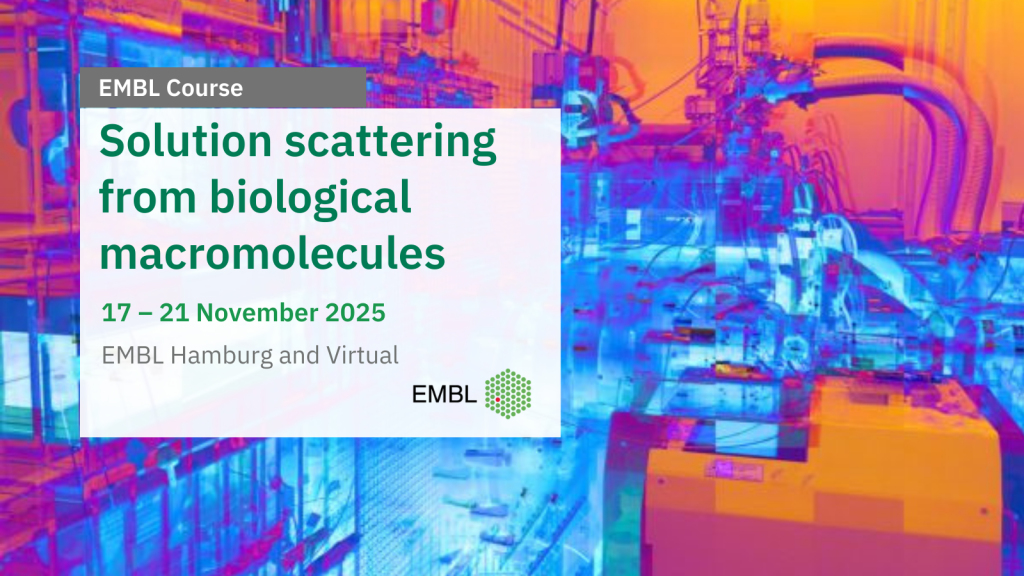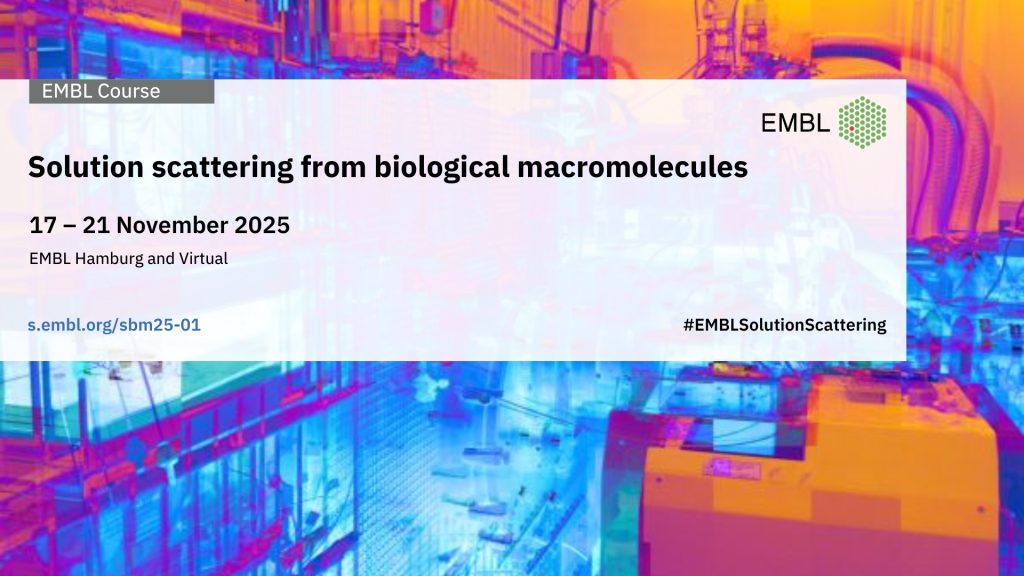Overview
Registration is not yet open for this event. If you are interested in receiving more information please register your interest.
Course overview
This course consists of two parts: a virtual module and an on-site module.
The series of online lectures will take place from 6 – 10 October 2025. In addition to this, a small number of selected students that have completed the virtual module will be offered to take part in the practical component of this course that will take place in Hamburg from 17-21 November, 2025. For the other students we will offer the possibility to collect data remotely.
We encourage advanced PhD students, postdocs and junior researchers to apply.
The virtual module lectures will cover the basics of SAXS/SANS, instrumentation, data collection, modelling techniques and complementary use with other methods. A self-paced practical tutorial accompanied with a SASQUEST challenge will be provided and all students are encourage to participate in these exercises. The material will cover basic and advanced SAXS data processing steps.
In the on-site module, there will be 2 tracks offered focusing on different aspects of SAXS data collection. Applicants will be able to select a preferred track during motivation letter submission.
Students that are not taking part in the on-site module will be able to sign-up for small online discussion groups. These discussion groups will be led by one of the course speakers/tutors and you will be given the chance to discuss your own data/SAXS experiments with your peers.
Audience
The course is aimed at young biochemists/biophysicists and researchers active in related structural methods with little or no experience in solution scattering.
The virtual module is aimed at early career scientists interested in expanding their knowledge in SAXS.
On-site track 1: X-ray beamline operation is aimed at advanced pre-docs/early-stage postdocs interested in working with synchrotron radiation and technical aspects of scattering experiments. During the practical, you will learn different steps for commissioning and calibrating a beamline, how to streamline workflows, and what to consider for data collection and management.
On-site track 2: sample preparation and optimization for SAXS is aimed at pre-doctoral and postdoctoral fellows with a background and/or an interest in biochemistry. In this track, we will be looking at best practices in sample preparation and data collection as well as various tools for data quality assessment. Students are encouraged to bring their own samples.
Modules/resources
- SAXS data collection
- Data processing
- Basic analysis
- Novel SAXS data analysis methods
- Integrative structural biology
- Reporting and quality assessment
Learning outcomes
During the virtual module of the course, we will take a look at all essential steps of SAXS data analysis, from applying for beamtime, collecting, processing, and analysing SAXS data, as well as proper reporting and quality assessment.
At the on-site module, deeper insights into beamline operation or optimization of measurements can be gained.
What past participants say about the course
“Participating in the EMBL course on “Solution Scattering from Biological Macromolecules” was a delightful experience, with its intimate setting enabling personalized discussions and the well-organized workshop offering ample opportunities for in-depth conversations and data analysis support. Meeting the BioSAXS group was a particular highlight, as their expertise and approachability made the entire experience both educational and enjoyable.” – Jaka Snoj, Department of Synthetic Biology and Immunology, National Institute of Chemistry, Ljubljana, Slovenia
“At the EMBL course, a distinguished team of experts and beamline scientists provides an invaluable toolbox for SAXS data analysis. From Ab initio to Hybrid models, this comprehensive course offers a unique opportunity for both newcomers to scattering and individuals like myself, who have recently ventured into the study of biomacromolecules through scattering techniques.” – Davide Schirone, Malmö University, Sweden
Practical information
Registration fees and motivation letter
The number of participants will be limited to 60 virtual participants and 10 participants for the on-site module.
When applying for this course you will have the possibility to apply for only the virtual module or for both virtual and on-site modules. Please note that only students that have completed the virtual module will be taken into consideration in the selection for an on-site module.
Registration
Registration fees for the virtual module include access to online lectures and other course materials.
| Academia | €120 |
| PhD Student | €75 |
| Industry | €150 |
Registration fees for the on-site module include accommodation in single rooms at the DESY guesthouse, all meals throughout the duration of the course, and course materials. Travel expenses are NOT covered with the registration fee.
| Academia | €600 |
| PhD Student | €550 |
| Industry | €1000 |
Please note that students selected for the on-site module will have their virtual module registration fee waived and will only have to pay the on-site registration fee.
A letter to support your visa application will be issued, on request, once payment of the registration fee is confirmed.
We recommend that you book your visa appointment as soon as possible, to avoid any delay with your visa application.
Confirmation and payment
The registration fee should be paid only after acceptance to the course. The results will be announced approximately 2-3 weeks after the application deadline.
Motivation letter submission
After you have logged in and successfully registered, you will receive an email asking you to submit your motivation letter. Click on the link provided and enter your motivation letter in the text box provided. Alternatively you can submit your motivation letter by clicking on the link on the confirmation page directly after registering.
Instructions
- Include your relevant skills, experience and qualifications showing why you would be suitable for the course.
- Explain why you would like to attend, including what you can contribute and how you think you will benefit from the course.
Please note:
- The limit of 2000 characters refers to manually typed text and excludes spaces. If an error occurs try using a different web browser (preferably Google Chrome or Mozilla Firefox).
- If you copy-paste the text into the form, hidden formatting might still be included which may cause the text to exceed the 2,000 character limit resulting in an error message. We recommend you clear all formatting before pasting in the text.
- If you have special symbols in your text, make sure you are using Unicode characters, otherwise these will not be recognised.
For more detailed information, follow the instructions provided in our video on how to submit a course motivation letter.
Further details
For further information about registration and motivation letter submission please refer to the FAQ page.
Financial assistance
Limited financial assistance in the form of both registration fee waivers (for virtual module) and travel grants (for the on-site module) is available for this course. You will be able to apply for the financial assistance during the motivation letter submission process.
Your place in the meeting is only confirmed by paying the registration fee, which is mandatory even when receiving a fee waiver.
Registration fee waiver
The fee waiver will cover the registration sum that you have paid to attend the course or conference.
Travel grant
Recipients will be notified of their travel cap amount when they are informed of the outcome of their application. Original receipts must be provided with your signature for all costs incurred within two months of completion of travel. Scanned copies cannot be accepted.
Application
You may apply for financial assistance when submitting your motivation letter for courses, and abstract for conferences. In your application you will be asked to answer questions regarding why your lab cannot fund your attendance and how your attendance will make a difference to your career. Application for financial support will not affect the outcome of your registration application.
Selection
The scientific organisers will select the recipients of all financial assistance during the motivation letter or abstract selection process. Results will be announced approximately 6-8 weeks before the event start date, however for some events this may be delayed. Selection results do not impact your admission to the meeting. Selection is based on your current work or study location, the reasons for needing financial support and the impact this event will have on your career.
Reimbursement
Costs will be reimbursed after the meeting only once a reimbursement form and original receipts (from travel costs) have been received.
Further details
View our list of external funding opportunities and information on attending a conference as an event reporter.
For further information about financial assistance please refer to the FAQ page.
Accommodation and transport
Reservations for single room accommodation at the DESY hostel have been made. Note, accommodation is included in the registration fee. The guest house is within a few minutes’ walk from the EMBL laboratories and P12 beamline.
Further information
Address: EMBL Hamburg, Notkestraße 85, Buliding 48e, 22607 Hamburg, Germany
From Hamburg airport take line S1 to Othmarschen (18 stops, 45 min), change to bus number 1 towards Rissen or Schenefelder Holt to Zum Hünengrab (DESY) (5 stops, 10 min).
From Hamburg-Altona train station take bus number 1 to Zum Hünengrab (DESY) (15 stops, 25 min). Ticket costs Public Transport: ca. €3.60 and a taxi will be around €45.
Technical requirements and event software
Event software
The EMBL eCampus learning platform will be used to collaborate, communicate and network with all of the course participants. All participants will receive information on how to join shortly before the course. We recommend using Chrome, Safari or Mozilla Firefox browsers for eCampus.
At the mandatory on-boarding session on Wednesday, 1 October the functionalities of the platform and course content will be further explained.
Technical requirements
Information will be provided for installation of the newest ATSAS package in advance. This will be needed to accomplish the SAXS Quest that will be offered in parallel to the SAXS virtual module.
COVID-19 related questions
Updated information will be provided closer to the time of the on-site module.
Sponsors
Sponsorship opportunities
We offer a variety of event sponsoring possibilities, with the flexibility to select a set sponsorship package or combine individual sponsorship options to suit your event budget. Discounts are available for companies sponsoring multiple events at EMBL Heidelberg. View other conferences, or contact sponsorship@embl.de for further information.
If you are interested in becoming a media partner of this event, please visit our media partnerships webpage.
Warning
EMBL wishes to warn sponsors of EMBL conferences and courses of fraudulent schemes purporting to offer sponsorship opportunities on behalf of EMBL or affiliated with EMBL officials. One current scam campaign of which we are aware is conducted using the name ‘Judy Eastman’ (judy@gopcontact.a2hosted.com) and entails approaches to sponsors offering sponsorship opportunities on EMBL’s behalf. Please be kindly advised that all relevant communication regarding sponsorship of EMBL conferences, symposia and courses is handled by EMBL directly and is sent from an official EMBL account. EMBL does not work with any external providers on sponsorship acquisition.
Please also note that:
- EMBL never provides attendee lists for purchase. Any offers of such are fraudulent.
- EMBL will never call or email you to ask for your credit card details or to request a payment.
- All payments are on invoice.
Suspicious communications purportedly from, for or on behalf of EMBL should be reported to EMBL at the following email address sponsoring@embl.de.
Media kit
Want to let others know you’re attending this event? Take a look at our shareable media and feel free to use them in your social media channels or presentations.




Date: 17 - 21 Nov 2025
Location: EMBL Hamburg and Virtual
Venue: EMBL Hamburg
Organisers:
-
Clement Blanchet
EMBL Hamburg, Germany -
Melissa Gräwert
EMBL Hamburg, Germany
Contact: Luana Ribeiro